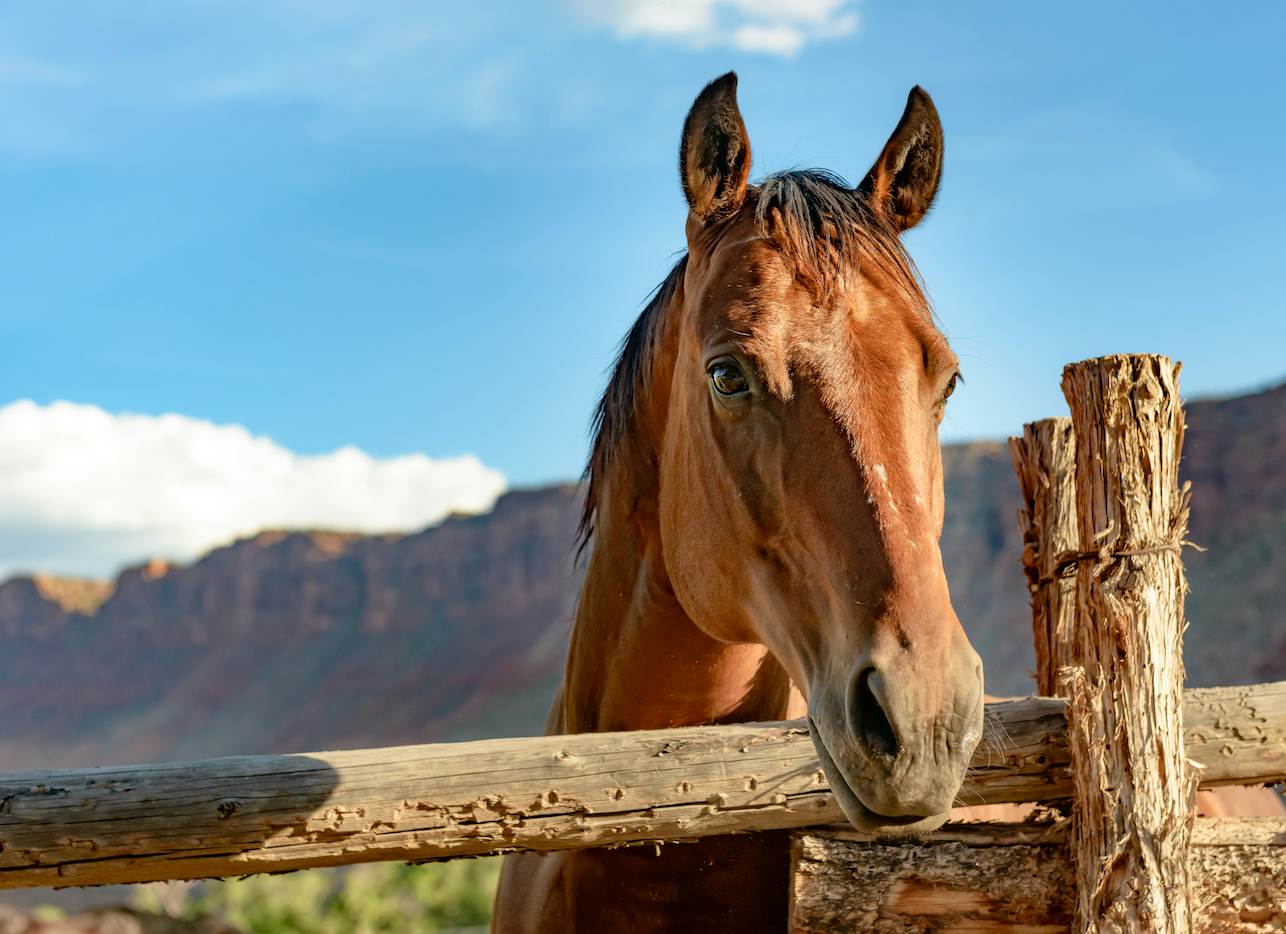The Missing Piece to Solving Cribbing in Horses
February 21, 2024

Cribbing, also known as windsucking, is a behavior that is commonly heard of in the world outside of horses, but no one seems to really understand what it is or what it can do to our horses. Those in the horse world know exactly what cribbing is and, although it’s a frustrating behavior, horse owners must do their best to prevent the behavior and get to the root of the problem.
If horse owners don’t take action in time, and sometimes even if they do, there appears to be a correlation with ulcers and ultimately, overall digestive health. At first glance, this may not sound logical. Let’s think about us as humans for a minute. Have you ever heard of someone developing an ulcer because they’re just insanely stressed? Yep, me too. Let’s get to the horse talk.
What Exactly is Cribbing?
Essentially what happens during cribbing is the horse grasps an object (usually a fence or stall door) with their front teeth, contracts the muscles in their neck, and pulls back. A grunting sound sometimes accompanies the behavior.
Cribbing is known to cause health problems in horses including weight loss, abnormalities in the neck muscles, and excessive dental wear.
How Common is it?
According to UC Davis’ Center for Equine Health, “The behavior has been well documented in domesticated horses, with an estimated 5-15% prevalence. Cribbing has also been reported in some captive wild horses, such as the Przewalski horse, but has not been observed in wild, or feral, free-ranging horses. It is uncommon in donkeys and mules.”
Why Do Horses Crib?
Cribbing, also known as crib-biting, is a behavior some horses exhibit often due to stress, frustration, and/or complications in their nervous system. This activity results in the release of endorphins in the brain, offering the horse a fleeting sense of satisfaction or pleasure.
In past interviews, Dr. Keith Latson, FullBucket co-founder and equine surgeon, emphasizes that “you have to consider social stressors. Horses separated from their buddies, horses recovering from surgery or those on lay-up because of musculoskeletal injury are also undergoing immense physiologic and social stress even though they’re not competing in a high stakes race.”
Basically, if a horse is feeling down in any way, cribbing releases endorphins which makes them feel good. They may have started cribbing due to being separated from others or other stressors, but if you could do something that released a “feel-good” hormone whenever you wanted, wouldn’t you continue doing it? Humans do this all the time by scrolling social media.
The Relationship Between Ulcers and Cribbing
Cribbing impacts a large number of horses and goes beyond being a mere bad habit; it's a sign that may suggest underlying issues, such as gastric ulcers.
Diet Can Disrupt Acid Balance
Although cribbing is commonly dismissed as just a bad habit, it's crucial to understand that this behavior can originate from multiple underlying causes, including dietary deficiencies and environmental stressors. High-starch diets, a common practice in equine nutrition, can disrupt the delicate balance of stomach acids and lead to the development of ulcers.
Limited Turnout and Confinement Don’t Help
Coupled with this, limited turnout and confinement contribute to a lack of natural grazing behavior, a crucial element for maintaining gastric health.
Stressful environments, whether from isolation, competition, or frequent travel, exacerbate these conditions, creating a perfect storm for ulcer formation.
Inflammation in the Stomach
New research has shown a complicated connection between cribbing in horses and stomach ulcers. Studies found that horses who crib are much more likely to have stomach inflammation and ulcers than horses who don't crib.
This could mean that the pain from ulcers makes a horse start cribbing to feel better, but at the same time, cribbing might also make it easier for ulcers to form. For example, when horses crib a lot, they produce more saliva, which might help neutralize the stomach acid and act like a natural remedy for them. It goes both ways and is a bit of a “chicken or egg” situation. What we know for sure is that cribbing in horses typically points to another issue.
Are There Solutions?
Fortunately, there are some solutions to help with cribbing. Appropriate feeding schedules, sufficient time spent outdoors, and the use of effective probiotics along with additional digestive-supporting nutrients can contribute to stabilizing your horse's stomach and digestive system overall.
Management Strategies
Implementing a feeding strategy that ensures horses have constant access to high-quality forage can substantially reduce the likelihood of gastric ulcers. This method maintains a consistent pH balance in the stomach, minimizing the irritation from gastric acids.
Plus, a diet that is low in high-starch foods is essential, as these can ferment in the hindgut, generating acids that may result in ulcers if there isn't enough forage to buffer them.
Supplements
Introducing dietary supplements that promote gut health can also be beneficial, with options like Athletic Formula that can help reduce the negative effects of stress in performance horses.
Probiotics can significantly help horses with stress-related behaviors, like cribbing, and maintain gut health. The basic idea of using probiotics for horses with gastric ulcers is to adjust the balance of good bacteria in their gut. This helps make their gut healthier, strengthens the protective lining of their stomach, and reduces inflammation.
Gut Health and Microbiota Balance
Probiotics introduce beneficial bacteria into the horse's gut, which can help in restoring the balance of the microbiome. This balance is crucial for horses (and other animals), especially those experiencing stress from cribbing, since stress can disrupt the gut microbiota.
The appropriate ratio of good bacteria and bad bacteria in the gut helps support homeostasis, which helps horses digest food and absorb nutrients properly. This can aid in healing ulcers indirectly by ensuring the horse takes in all the nutrients they need to remain healthy.
Enhancement of Barrier Function
The lining of the horse's stomach and intestines acts as a barrier against harmful substances and pathogens. Probiotics can enhance the integrity of this barrier, reducing the chance of ulcer formation. They do this by promoting the production of short-chain fatty acids (SCFAs) like butyrate, which serves as an energy source for the cells lining the gut, strengthening the gut barrier.
Anti-Inflammatory Effects
Probiotics can have anti-inflammatory effects within the gut, which is beneficial in the context of ulcers. Gastric ulcers involve inflammation of the stomach lining, and by reducing this inflammation, probiotics can aid in the healing process.
Probiotics can adjust the body's immune response through the use of probiotics. Without this balance, excessive inflammation can occur, making ulcer symptoms worse.
Stress Reduction
While not directly related to the probiotics' action on the gut microbiome, improving gut health can have a positive impact on a horse’s well-being, including their levels of stress and anxiety.
Since cribbing is often associated with stress, anything that can reduce stress can also potentially reduce the incidence of behaviors that lead to ulcer formation.
Prevention is Best
Although you can’t control everything, attempting to prevent cribbing in the first place is helpful if your equine pal isn’t already showing the behavior. Grab some probiotics and get their gut health on track before your horse’s mental and/or physical health is affected by imbalances.
Read More:
Management Considerations for the Cribbing Horse
Study of Crib-Biting and Gastric Inflammation and Ulceration in Young Horses
Equine Gastric Ulcer Syndrome: An Update on Current Knowledge
Crib Biting and Equine Gastric Ulceration Syndrome
Photo by Stephen Walker on Unsplash

